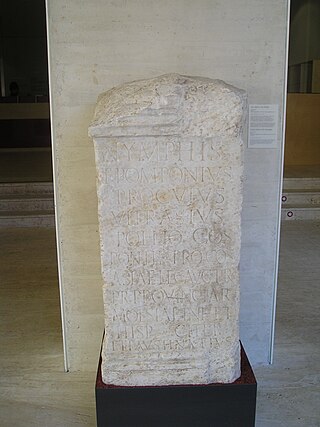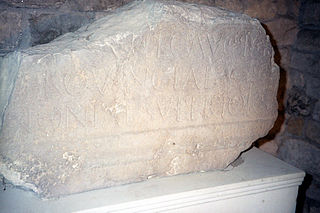Related Research Articles
Publius Seius Fuscianus was a suffect consul c. 151, Praefectus urbi from 187 to 189, and consul ordinarius in 188. He was a childhood friend and schoolmate of Emperor Marcus Aurelius.

Titus Pomponius Proculus Vitrasius Pollio was a Roman senator, who held several imperial appointments during the reign of Marcus Aurelius. He was suffect consul in an undetermined nundinium around 151; he was a consul ordinarius in the year 176 with Marcus Flavius Aper as his colleague.
Servius Cornelius Scipio Salvidienus Orfitus was the name of several Roman men who lived during the early Roman Empire. They were descendants of Orfitus who was adopted by Servius Cornelius Scipio, an otherwise unknown member of the patrician branch of the Cornelii Scipiones.
The gens Laberia was a minor plebeian family at ancient Rome. Members of this gens are first mentioned in the second century BC, at which time they held senatorial rank. Most of the members mentioned later were equites, but toward end of the first century AD they attained the consulship, which several of them held throughout the second century.
Lucius Dasumius Tullius Tuscus was a Roman senator who was an amici or trusted advisor of the emperors Antoninus Pius and Marcus Aurelius. He was suffect consul in the nundinium of April to June 152 AD as the colleague of Publius Sufenas.
Marcus Pontius Laelianus Larcius Sabinus was a Roman senator and general who held a series of offices in the emperor's service. He was suffect consul for the nundinium of July-August 145 as the colleague of Quintus Mustius Priscus. Laelianus is primarily known through inscriptions.
Titus Flavius Longinus Quintus Marcius Turbo was a Roman senator who held a series of offices in the emperor's service. He was suffect consul for one of the nundinia in the years 149 through 151. Longinus is known primarily from inscriptions.
Quintus Fuficius Cornutus was a Roman senator active in the first half of the second century AD, who held a number of offices in the emperor's service. He was suffect consul for the nundinium April-June AD 147 with Aulus Claudius Charax as his colleague. Cornutus is known only from inscriptions.
Gaius Arrius Antoninus was a Roman senator and jurist active in the last half of the second century AD, who held a number of offices in the emperor's service. The date when he was suffect consul is not attested, but has been estimated to be around AD 173. Edward Champlin includes him, along with Gaius Aufidius Victorinus and Tiberius Claudius Julianus, as "marked out as a special intimate of Fronto's." Champlin notes that while Victorinus received five of the surviving letters of the rhetor Fronto, "as the beloved pupil and son-in-law", Antoninus received four, taking "the place of Fronto's son."
Quintus Cornelius Quadratus was a Roman senator who held a number of offices in the emperor's service. He served as suffect consul for the nundinium July-September 147 as the colleague of Cupressenus Gallus. Quadratus is best known as the brother of the orator Marcus Cornelius Fronto. He is mentioned four times in the surviving correspondence of the orator.

Marcus Iallius or Jallius Bassus was a Roman senator, general, and literary figure who held several offices in the imperial service during the mid-second century AD. He was suffect consul around the year 159. Bassus is known primarily from inscriptions. His full name was Marcus Iallius Bassus Fabius Valerianus.
Quintus Pompeius Sosius Priscus was a Roman senator active in the mid-second century AD, who held a number of offices in the emperor's service. Priscus served as ordinary consul for the year 149 as the colleague of Lucius Sergius Salvidienus Scipio Orfitus. His life is known entirely from inscriptions.
The gens Salvidiena was a plebeian family at ancient Rome. Members of this gens are first mentioned toward the end of the Republic, and from then to the end of the second century they regularly filled the highest offices of the Roman state.
The gens Seia was a minor plebeian family of equestrian rank at ancient Rome. Members of this gens are first mentioned in the time of Cicero, and a few of them held various magistracies under the late Republic and into imperial times.
Lucius Coelius Festus was a Roman senator, who was appointed to several praetorian offices during the reign of Antoninus Pius. He was suffect consul in the nundinium of July-September 148 with Publius Orfidius Senecio as his colleague. Mireille Corbier describes his known career as that of an administrator occupying a modest spot in the Senate. Festus is known entirely from inscriptions.
Quintus Egrilius Plarianus was a Roman senator, who was active during the reigns of Antoninus Pius and Marcus Aurelius. He was suffect consul for one of the nundinia in the first half of AD 144, as the colleague of Lucius Aemilius Carus. Plarianus was the son of Marcus Acilius Priscus Egrilius Plarianus; he also is known to have had a sister, Egrilia M.f. Plaria. Although his family had its origins in Ostia, it is likely he spent most of his life in Rome.
Publius Cluvius Maximus Paullinus was a Roman senator, who held a number of imperial appointments during the reigns of Hadrian and Antoninus Pius. He was suffect consul during an undetermined nundinium between 139 and 143. He is known entirely from inscriptions.
Marcus Servilius Fabianus Maximus was a Roman senator, who was active during the reigns of Antoninus Pius and Marcus Aurelius. He was suffect consul in a nundinium in mid-158 with Quintus Jallius Bassus as his colleague.
Marcus Cominius Secundus was a Roman senator, who was active during the reign of Marcus Aurelius. He was suffect consul in one of the later nundinia of 151 with Lucius Attidius Cornelianus as his colleague. He is known from inscriptions and military diplomas issued during his time.

The gens Iallia was an obscure plebeian family at ancient Rome. Members of this gens are not mentioned in ancient writers, but they rose to prominence during the middle part of the second century, with two of them achieving the consulship under Antoninus Pius.
References
- ↑ Géza Alföldy, Konsulat und Senatorenstand unter der Antoninen (Bonn: Rudolf Habelt Verlag, 1977), p. 180
- ↑ Alföldy, Konsulat und Senatorenstand, p. 101 n. 13
- ↑ Anthony Birley, Marcus Aurelius, revised edition (London: Routledge, 1987), pp. 238, 247
- ↑ Ancient Bath Complex Unearthed in Rome (Accessed 29 October 2017)
- ↑ CIL VIII, 5354
- ↑ Alföldy, Konsulat und Senatorenstand, p. 264 n. 314